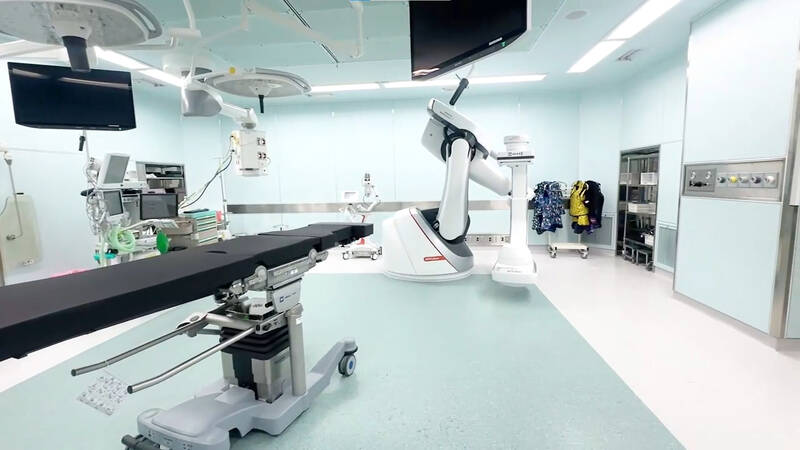前法國中量級拳王為答謝照護他岳父的醫護人員,教她們打拳擊舒壓,新聞報導刊出的照片底下有一行英文說明:
Operating theater nurse Kenza Benour trains with boxer Hassan N’Dam at VSG hospital on the outskirts of Paris on Wednesday. (AP)
(May 30, 2020)

Photo: CNA l 圖片 : 中央社
說明中的 operating theater 就是指「手術室」,不是 *演出中的劇院。
以下這篇文章,提到 2020 年英國因為新冠肺炎病人多到難以招架,有一家醫院甚至把 all its theaters 都改裝,以容納大量湧入的新冠肺炎病人。
The UK health system is so overwhelmed that a hospital is converting all its theaters for coronavirus patients, and nurses have panic attacks because they can’t cope with the stress.
(Mia Jankowicz, Business Insider , April 7, 2020)
文中出現的 theaters,也不是指劇院,而是「手術室」。
之前有不少文章或活動,向新冠肺炎危機期間的第一線醫護人員表達感恩與致意,底下就是一例:
Give an “extra clap” tonight for operating theatre staff during Covid-19 crisis
(Steve Ford, Nursing Times , May, 14, 2020)
手術室為什麼叫 operating theater?因為19世紀之前,為方便醫學教育,手術室通常都模仿古希臘劇場,設計成階梯狀,方便醫學生觀摩學習,因此得名。
我自己曾經進過手術室,2018 年 7 月我做了一個疝氣修補 (hernia repair) 的腹腔鏡手術 (laparoscopy)。離開手術室兩三個小時後,已經能從輪床 (gurney) 勉強翻身,移到自己的病床 (ward bed)。
腹腔鏡手術 (Laparoscopic Surgery) 又稱「微創手術」minimally invasive surgery (MIS), keyhole surgery,或 band aid surgery, 通過腹部開幾個 0.5 至 1.5 cm大小的小切口 (incision),做為端口 (port),插入套管針 (trocar)、腹腔鏡 (laparoscope)、光源導管 (fiber optic cable system) 和其他外科工具,接者打入二氧化碳氣體,撐開腹腔進行手術。它比傳統的開腹手術,痛苦少,恢復快。
最後要提醒的是英文的 theater of operations 和 operating theater(手術室)很像,但是卻是指「戰區」。譬如第二次世界大戰,「太平洋戰區」叫 WWII
Pacific theater of operations。此外,THAAD 薩德反飛彈系統(終端高空防禦飛彈),早期稱為戰區高空防禦飛彈 (formerly Theater High Altitude Area Defense),其中的 theater 也是指「戰區」。
防疫必備詞彙:病理症狀
味/嗅覺異常 abnormal sense of smell and taste
味/嗅覺喪失 loss of smell and taste
輕症 mild case
重症 severe case
肺浸潤 pulmonary infiltrate
潛伏期 incubation period
無症狀潛伏期 asymptomatic incubation period
免疫風暴(細胞激素風暴) cytokine storm(就是人體的免疫系統過度反應,出現防禦過當的情況,嚴重會導致死亡。)
文章由書林出版公司提供:
www.bookman.com.tw
蘇正隆 — 台灣翻譯學學會前理事長、師大翻譯研究所兼任副教授; 編著《英語的對與錯》,《世紀病毒:必讀防疫英文知識與詞彙》...等

In most cities, food waste is often regarded as one of the most troublesome types of waste: it has a high moisture content, spoils easily and produces strong odors. If not handled properly, it can cause serious sanitation and environmental problems. From the perspective of the circular economy, however, food waste is not “useless leftovers,” but rather an organic resource that has yet to be effectively utilized. The core principle of the circular economy is to break away from the linear model of “production–consumption–disposal,” allowing resources to circulate repeatedly within a system and extending their useful life. Food waste occupies a

In June, headlines shocked the art world when a visitor damaged a 17th-century painting at the Uffizi Galleries in Florence, Italy, while posing for a photograph. This was not an isolated event. Recently, similar disasters have been reported worldwide, from a child damaging a Mark Rothko painting to a tourist breaking an exhibit by pretending to sit on it. Such incidents highlight why museum etiquette is increasingly crucial. First, we must recognize that art and historical objects are fragile. Once damaged, they may never regain their original condition. Many common actions, though harmless at first glance, can have grave consequences. For

A: Google has unveiled its 2025 Year in Search chart. No. 10 to No. 6 are: Typhoon Podul, Chinese drama “Love’s Ambition,” tariffs, US President Donald Trump and singer Khalil Fong’s death. B: Wow, actress Rosy Zhao’s new drama is so popular. So what are the top five? A: No. 5 to No. 1 are: Gemini, hanzii.net, NT$10,000 cash handout, entertainer Big S’ death and earthquakes. B: Hasn’t Trump topped this year’s most-searched people chart? A: Yup, and he’s closely followed by cheerleader GuoGuo Chiang at No. 2, whose husband Zack Fanchiang is also at No. 8. Apparently, people are curious about her extramarital

Continued from yesterday(延續自昨日) The study also uncovered a correlation between breathing patterns and mental well-being. Participants with higher scores on anxiety questionnaires exhibited shorter inhalation periods and more frequent breath pauses during sleep. “We intuitively assume that how depressed or anxious you are changes the way you breathe,” says one researcher involved in the study. “But it might be the other way around.” If this proves true, then training people to adjust their breathing may offer a novel approach to managing conditions like anxiety or depression. 該項研究也揭露了呼吸模式與心理健康之間的關聯。在焦慮問卷得分較高的受試者於睡眠期間表現出的吸氣時間較為短促、呼吸中止更為頻繁。一位參與研究的學者表示:「我們直覺地認為憂鬱或焦慮的程度會改變你的呼吸方式,但有可能是反過來的情況。」如果這一假設得到證實,那麼訓練人們調整呼吸的方式,可能會成為管理焦慮或憂鬱等疾病的新穎方法。 What Did You Learn? 1. What problem did scientists previously face when trying to measure breathing patterns? 2.